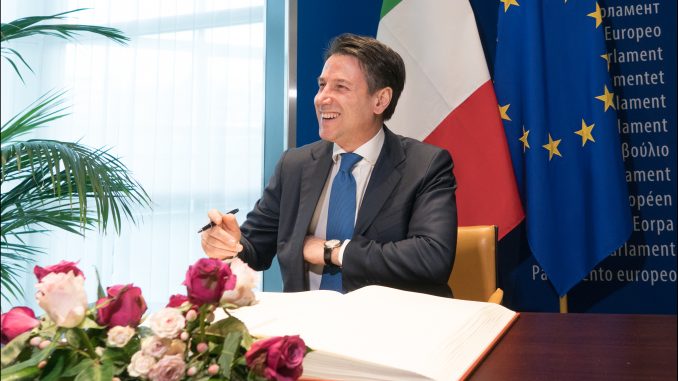
The Italian government have used the coronavirus crisis to embark on a decided return to the statist policies of the past, reversing decades of privatization and market liberalization in order to enact barriers for foreign investors, increase the state’s stake in any number of sectors and build so-called “national champions”.
Although these interventions have been couched in populist terms, they are threatening to tear the country’s fragile populist coalition apart as soon as this week. That apparent contradiction in terms is explained by the fact that most people aren’t seeing any benefit from the Conte administration’s spending spree, given that there often appears to be little rhyme or reason to how Rome is choosing to inject huge amounts of capital into the private market, not to mention the myriad sound economic reasons why European markets were liberalized in the first place.
Should the Italian government continue on this reckless path of assimilating interests from all manner of sectors without any coherent strategy in place, it could undo decades of progress, set a dangerous precedent for other countries, and sink Conte’s government.
Lack of coherence creating tensions
Italy has taken full advantage of Brussels’ relaxation of budgetary and regulatory controls amidst the coronavirus pandemic. In the last 12 months, the government has renationalized flagging airline Alitalia, which has failed to turn a profit in over 20 years. It has loaned €6.3 billion to automotive giants Fiat Chrysler, purchased a €10 million stake in menswear brand Corneliani and launched a €2 billion fund intended to purchase the properties of failing hotels—while leaving management in the hands of their former owners. It has also attempted to buy stakes in Ilva steelworks, toll road network Autostrade per l’Italia and national stock exchange Borsa Italiana, often through its state-owned lender Cassa Depositi e Prestiti (CDP).
Elsewhere, Rome has sought to discourage foreign investment, as evidenced by its expansion of so-called “golden power” laws. To date, it has probed the status and voting rights possessed by French media conglomerate Vivendi with regards to its stake in Silvio Berlusconi’s Mediaset SpA company, and tried and failed to use the golden power to block the foreign acquisition of small telecoms outfit Retelit.
As well as driving Italy towards unprecedented levels of public debt, the moves have created consternation within the ruling coalition, as former Prime Minister Matteo Renzi has threatened to destabilize the government by withdrawing his party’s support over fears Conte will misspend Italy’s €209 billion in EU coronavirus recovery funds. “If someone wants to spend it badly, they can do so without us,” Renzi explained.
Single broadband operator could lead to multiple consumer headaches
One of the biggest bones of contention has surfaced over Rome’s push to create a single broadband operator. Lockdown measures exposed the isolation of many rural communities and the inadequacy of the internet serving them; at present, Italy has the 47th fastest internet speed in the world, one of the slowest of any EU country.
In order to address the situation, the Italian government has backed a merger between the market’s largest player Telecom Italia (TIM) and rival Open Fiber. Rome argues that the plan could accelerate the lagging rollout of telecom infrastructure, but it may well create a conflict of interests due to the fact that TIM want to retain a controlling stake in the infrastructure while actively using the service as an operator.
What’s more, the enthusiasm behind the merger neglects the fact that decades of TIM stewardship have led to the current predicament in the first place. With no competitor to challenge their monopoly, TIM’s internet became a sluggish, unresponsive but expensive beast, frustrating consumers and contributing to the country’s poor digital performance. Indeed, it was only the introduction of Open Fiber in late 2015 which prompted a turnaround in national fortunes, allowing 8.5 million homes in Italy to receive ultrafast broadband today and catching the attention of other countries like Germany and the UK with the results of its multi-operator model. Indeed, TIM has demonstrated that it hasn’t changed its spots since; as recently as March 2020, the company was fined €116 million for stifling competition.
It is for those reasons that returning to the single-party oversight of TIM has been called “a backward step” by the country’s communication watchdog. Concerned consumer groups have even penned a letter of complaint to the European Commission, claiming that the move could spark a wider movement towards a “quasi-monopolistic” market structure across the bloc and beyond.
Antitrust authority is true consumer champion
While the coalition government were elected on a platform of populist promises, the TIM-Open Fiber case appears to underline that they are more committed to lining the coffers of state lender CDP than helping the Italian population. Instead, the country’s antitrust authority has emerged as the true people’s champion when it comes to looking after public interests.
Not only have the watchdog launched an investigation into the broadband deal in order to ensure that competition remains healthy and dynamic, but they have also probed a number of other firms in recent weeks. Rail operators Trenitalia and NTV and car insurance providers Allianz, Generali and UnipolSai have all been the subject of inquiries into allegedly unfair practices against their consumers, while the competition authority even issued a €10 million fine to tech behemoths Apple for doing the same.
At a time when economic hardship and healthcare worries have created a perfect storm for the Italian everyman, a powerful advocate fighting their corner is more needed than ever, a role that the Italian antitrust authority has stepped into even as Conte’s government seems to have abdicated it. A recent editorial noted that Giuseppe Conte, dubbed “the accidental prime minister”, has clung to his job longer than anyone expected, even fending off a power grab from Lega leader Matteo Salvini. His policy of bloating CDP’s ledger while failing to deliver for the Italian people, however, may be the final straw for his administration.


Leave a Reply